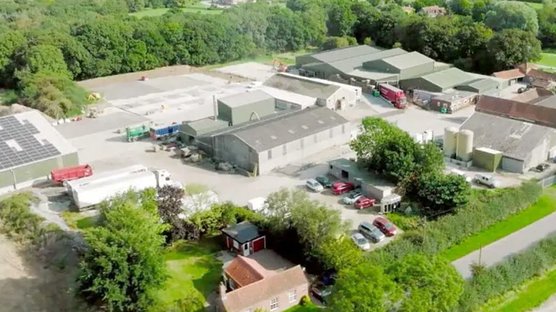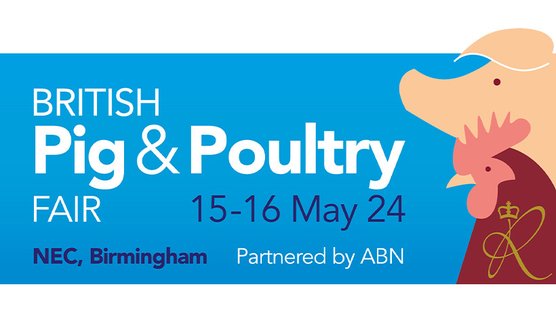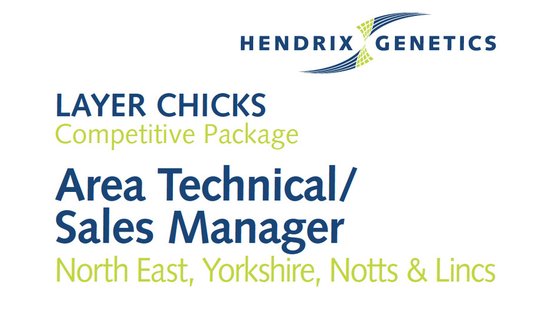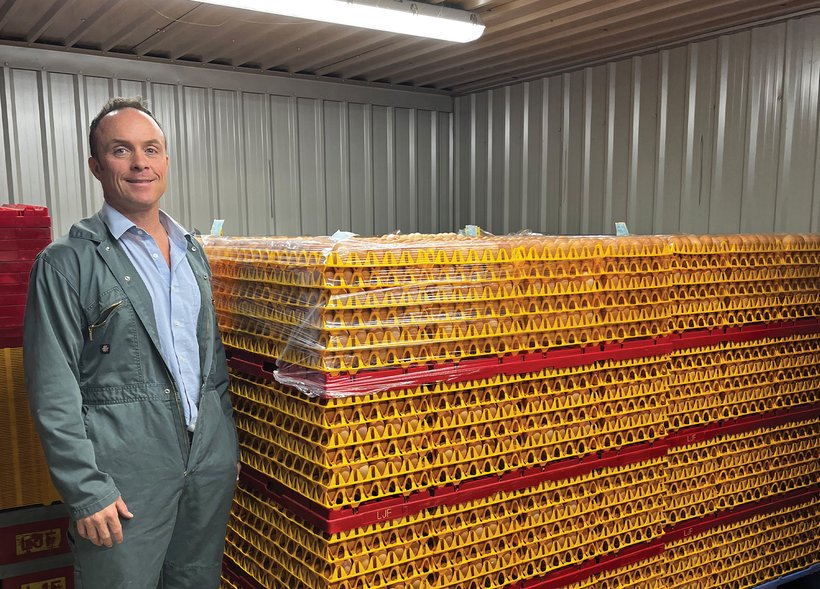
Published on July 14, 2022
Success for Bovans Brown at Hill Top Hens Horncastle
A strict routine, constant attention to detail and smart technologies reward Hill Top Hens.
Nestled on the southern edge of the Lincolnshire Wolds, Hill Top Hens are based at Hameringham, near Horncastle. The business is a family-run partnership between Stuart Russell, and his father, John Russell. Now on their third consecutive flock of 32,000 Bovans Brown, they are confident that their diligent approach to management, combined with their use of data and technology, is the secret to getting the best from the birds.
A fourth generation
W Russell and Son, started by Stuart’s grandfather, Walter, is the original farming business, which dates back to 1952. Three generations have farmed here and are now looking after 1150 acres of arable and pastureland. Tom Russell, who is currently at Newcastle University studying a BSc in Agriculture with Farm Business Management, is expected to add a fourth generation. Stuart, who gained a National Diploma in Agriculture from Shuttleworth Agricultural College, travelled in Australia, including working on a wheat harvest, before returning home to the farm in May 97.
The decision to diversify into egg production
As Stuart explains, a combination of factors led to the decision to diversify into egg production “In 2016 we were importing poultry litter for use on the arable farm, the benefits were clear to see in following crops, but returns from the arable activities were marginal, and at the same time, we were hearing good things about the egg sector. So, in 2017 we put in a planning application for a new 32,000 unit, which was granted after a committee decision”
We opted for the Big Dutchman Natura Step Multi-Tier Free Range House, which sits in 40 acres of grassland and trees, providing ideal ranging conditions for the hens.
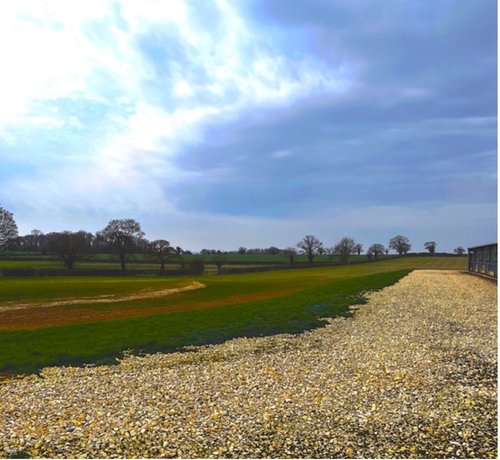
40 acres of grassland and trees at Hill Top Hens
Before choosing the system we looked at other local laying farms and chose Big Dutchman because we wanted something straightforward that fitted with our existing management practices. It is a system that is focused on the welfare of the birds, without disregarding functionality and efficiency, which is important to us as egg producers. It is easy to understand for the layers, and they can exhibit their natural behaviours and where they stay healthy and can lay their eggs under hygienic conditions.
Managing spiralling input costs
In common with all producers, Hill Top Hens are facing unprecedented challenges in the form of increased energy, labour, and feed costs. As Stuart says “Retail needs to understand the costs involved with getting an egg to their shelves and reward farmers by a fair margin above cost of production, something that is very much overlooked.
“From our side of things, I think that credit must go to LJ Fairburn for protecting their producers from rampant feed prices over the last 10 months. Things have just kept ticking over without any big swings so far. Things are financially challenging for us and any small gains in production make a difference to that.
“LJ Fairburns feed has remained competitive since last July and only increases in June 2022, but with that comes an egg price increase on medium, large, and extra-large to equal the increase in feed costs being passed on to us.
“My labour is pretty streamlined, and we have a modern unit with technology that means fewer staff can keep a tight ship. As always, attention to detail pays dividends and sometimes cutting corners to save money leads to a loss of production that usually outweighs what should have been spent in the first place”
Renewables
Solar panels were added after the first flock, when even back in 2017 electricity costs were higher than budgeted. “Now that energy prices have escalated, installing the 100 Kw solar system has turned out to be the best thing we ever did” Stuart says “We don’t have battery storage at the moment, but on sunny days all our needs are covered by solar power, at night we rely on the grid. Nevertheless, our bills have halved, and we may well explore battery storage after our current contract runs out. We have a neighbour who is completely off-grid with generator back up, and that may be the way forward. The egg business is challenging enough without energy price uncertainty”
Ready for an adventure
The poultry unit is run with the help of long-term farm worker, Mike Hewson. With no previous poultry experience between them, Stuart consulted Mike on the decision to diversify, asking him if he was ready for an adventure! Fortunately, he was up for it, and now, as Stuart is keen to acknowledge “he has thrown himself into poultry and his attention to detail is fantastic. Right from the start we have kept a detailed flock calendar, so we can learn from previous challenges, make improvements in pursuit of small gains in margins. For example, we now implement a daily low dose aqua clean to maintain clean water lines through the flock”
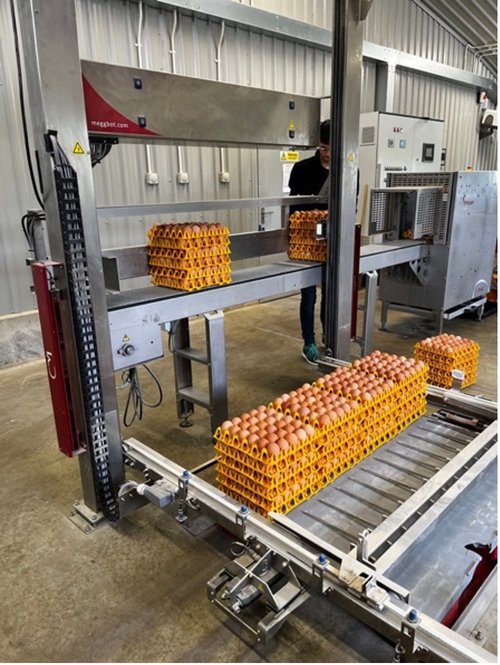
Meggbot Palletiser for automatic egg palletising
Dividends at the end of the cycle
Mike and Stuart bring the birds into lay at 21 weeks to get bird weight up. They are certain this pays dividends at the end of the cycle because the birds cope better with the larger eggs that the market demands.
The result of a balanced breeding programme by Hendrix Genetics, the Bovans Brown is a highly versatile and robust egg layer. A combination of high peak production, great laying persistency, and a flat egg weight curve ensures that the robust, adaptable, and easy to manage birds produce high numbers of first-quality dark brown eggs.
The current flock of Bovans Brown are laying at 95% at 72 weeks, which compares to the breed standard of 81%, these gains are especially vital at a time when margins are low. “We have previously depleted at 76 weeks, but we are going to 80 weeks with the current flock because of the good feather cover, and they are laying so well,” Stuart says.
“A lot of it is down to management” he believes “once they start laying, we don’t do anything different. Bovans react well to routine, so we do everything to maintain consistency, any routine tasks like topping grit feeders up, are done before lights turn on, and then we leave them to do what they do best – which is good egg numbers.
“Nothing beats being in the house, but the new technology allows us to keep an eye on the house and security, even when we can’t be there. We use Big Farm Network with sensors that give constant feedback, information, and data from sensors and cameras, accessed by phone through the Viper Touch control system. It monitors animal weights, daily weight gains, feed conversion and formulas, feed and water consumption, losses, climate data, luminous intensity, and power consumption.
“It is an extra cost, but the technology is invaluable and helps monitor a big investment – after all, it’s a remote site, and this gives us eyes and ears on the site when we can’t be here” Stuart explains.
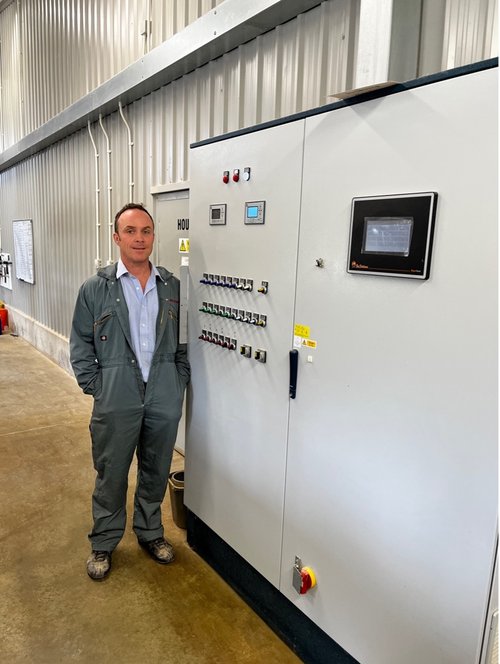
Technology is invaluable and helps monitor a big investment
Invaluable partnerships and support
Stuart recognises that the first flock was a steep learning curve. By working closely with their packer LJ Fairburn, who provides feed and pullets, Peter Rogerson of Joice and Hill, Ian Lowry at Crowshall Vets, and Big Dutchman the challenges were overcome.
The Bovans did so well despite the challenges, and carried on firing, they seem to like our management, so we are sticking with them

